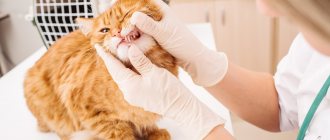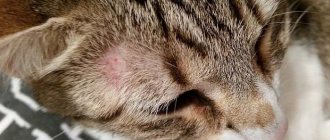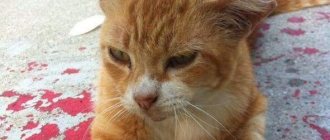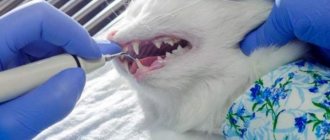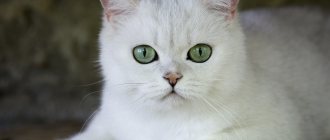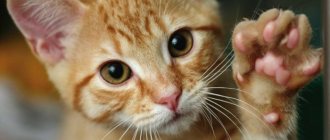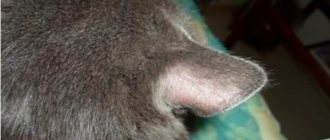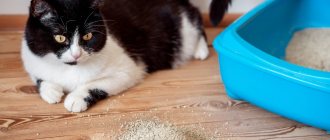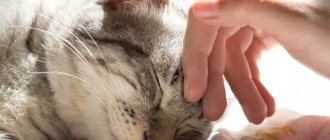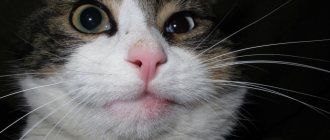Over the years, the cat family has evolved, which has led to the maximum survivability of cats. But even in modern times, animals can be subjected to various negative processes, in which a lot of unpleasant and life-threatening symptoms are observed. One of the severe processes is a condition in which bleeding comes from the cat’s mouth. A caring owner should know why a four-legged friend may bleed and how to prevent serious consequences.
What to do if your cat is bleeding from the mouth?
The cat family is distinguished by its amazing vitality and intelligence, acquired in the process of evolution and centuries of life next to humans. However, a pet's body is also susceptible to destructive effects when the cat bleeds from the mouth.
Today we will talk about this phenomenon with maximum care, consider the causes of its occurrence, treatment and preventive measures.
Dangerous accompanying symptoms
Unlike difficult-to-diagnose internal injuries, systemically developing diseases are usually accompanied by a number of characteristic symptoms that make it possible to detect the problem in time and give the caudate patient the correct diagnosis. With tumors and ulcers of the gastrointestinal tract, the animal does not just vomit blood, at this moment it feels a severe general malaise. This is expressed as follows:
- the pet becomes passive, apathetic and completely loses its appetite;
- against the background of nutritional problems, severe weight loss can be observed;
- due to a lack of nutrients in the body, the wool becomes brittle and dull;
- internal bleeding leads to problems with stool - its color and consistency changes, and regularity is disrupted.
Fundamental Concepts
If your pet is bleeding from the mouth, examine him, paying attention to:
- structure and condition of teeth and gums;
- possible damage to the lips;
- the color of the blood and its amount;
- presence/absence of odor, vomiting;
- general condition of the body: eating pattern, level of physical activity, muscle tone, thirst or dehydration.
Deviation from the norm in a cat of some indicators indicates the development of an unidentified disease. We strongly recommend that you seek qualified assistance on the same day.
Bleeding from the stomach
A sign of bleeding from the stomach is that the blood mixed with the vomit is coagulated: it is dark red or even brown in color (like coffee) due to the content of hemoglobin digested by the stomach.
The cause of gastric bleeding in a cat can be the disintegration of a tumor, worms, poisoning, as well as mechanical damage to the mucous membrane.
Such bleeding often leads to anemia. To detect it, just look at the cat’s oral mucosa: if it turns pale, this is a clear sign. The condition is also accompanied by apathy and sometimes fever. Ultimately, it leads to death if action is not taken. You need to apply cold to the stomach and immediately go to the vet.
Why is this happening
It is quite difficult to discover the causes of an unknown disease, so we will divide the further narrative into several blocks.
Injuries to the oral cavity
Drip bleeding from the mouth occurs when the surface of the head is damaged (due to “showdowns” with competitors), sensitive walls (consumption of malignant products or objects of unknown origin).
If your cat is bleeding from the mouth, pay attention to:
- Color – shades of red or pink, depending on the degree of dilution.
- Duration - with minor injuries, blood stops flowing within ten minutes, tooth loss is accompanied by a longer period.
- The nature of the leak - liquid flowing out in jerks, indicates damage to an important vessel or large capillary of the facial area of the head.
To stop bleeding from the mouth, you will need cotton swabs treated with a manganese solution. If first aid does not bring results, contact specialized institutions.
Lung damage
If the respiratory system is affected, periodic foam from the cat's mouth mixed with pink blood is observed. The phenomenon is characterized by a small amount of fluid and no coagulation. If you notice such symptoms, immediately take your cat to a veterinary clinic.
Poisoning with toxic substances
After examining the cat's vomit, we can draw a conclusion about the nature of the ongoing disease. The presence of brown impurities indicates damage to the gastric mucosa. Often occurs due to: eating household chemicals, specialized mixtures.
If the cat has eaten rat bait, additional vitamin K injections and blood transfusions and rinsing by probing will be needed.
It is important to know! Do not induce vomiting if your cat eats toxic substances. A hasty decision can cause damage to the esophagus and respiratory organs from the moving masses.
Blood and liver damage
Problems with blood clotting indicate a destructive effect on the above-mentioned organs of the cat. Often occur during exacerbations of non-contagious diseases, and are not accompanied by the release of foam.
We recommend that you contact a veterinary clinic to submit biochemical analysis materials, a coagulogram and undergo highly targeted treatment.
Bleeding in the stomach
Vomiting blood in a cat is a sign of damage to the sensitive walls of the stomach. The discharge has a brown tint and an unpleasant smell, and the consistency resembles the thick of infused tea.
The frequency of exacerbation depends on individual characteristics, degree and nature.
An exacerbation is accompanied by sharp pain in the abdominal area, which can be relieved by eating several pieces of ice and applying cold compresses to the affected area.
It is important to know!
Blood flowing out of the mouth in a stream is a clear sign of “holes” in the vessels of the abdominal cavity or stomach .
The question arises, what to do? The answer is extremely short - seek help from a veterinary clinic.
Bleeding from the esophagus
Blood in vomit is most often a sign of damage to the upper parts of the digestive system - the esophagus and stomach.
A sign of bleeding from the esophagus is a scarlet color mixed with the vomit.
The reasons why a cat vomits scarlet blood can be damage from bones and rough food eaten by rain or sausage wrappers, as well as various diseases - ulcers and tumors of the esophagus.
Also, causes of bleeding in the esophagus and stomach include taking medications that corrode the mucous membrane, and coagulopathy - a blood clotting disorder, which can result in massive bleeding even with minor inflammation and slight damage to the mucous membrane.
Blood from a cat’s mouth - what does this terrible symptom indicate?
Over the years, the cat family has evolved, which has led to the maximum survivability of cats. But even in modern times, animals can be subjected to various negative processes, in which a lot of unpleasant and life-threatening symptoms are observed. One of the severe processes is a condition in which bleeding comes from the cat’s mouth. A caring owner should know why a four-legged friend may bleed and how to prevent serious consequences.
Hidden bleeding
If bleeding begins in organs that do not communicate with the external environment, or is not accompanied by vomiting, the owner may not notice it. In this case, the only signs will be general symptoms:
- apathy and drowsiness;
- increased body temperature;
- dyspnea;
- weakness;
- pallor of the mucous membranes of the mouth;
- abdominal enlargement.
If such symptoms occur, you need to take the cat to the veterinarian. And it’s even more worthwhile to hurry if such symptoms began soon after bloody vomiting. This means that the bleeding is quite severe and the mucous membrane does not heal.
Proper examination of the animal
The first thing the owner of a furry cat should do is to carefully examine the oral cavity of the cat, as well as the entire body of the pet. During the inspection, you need to pay attention to the following aspects:
- condition and structure of all teeth and gums;
- assess the integrity of the tissues of the cheeks and lips, both internally and externally;
- the color of the blood and the location of its flow;
- determine whether your pet has the urge to vomit;
- presence of fetid odor of bloody discharge.
Along with the above points, you should remember what was in the pet’s diet, what food it ate, and whether there were situations where the animal could have been injured. It is also very important to assess for dehydration. If the cat has not drunk for a long time due to the injury, then you should give some water by pouring it through a syringe without a needle. Dehydration of the body is fatal. It should be remembered that cats have metabolic processes much faster than humans, so dehydration is very dangerous. During the examination, the general condition of the animal is also assessed, the presence or absence of muscle spasms and convulsions is determined.
Bleeding in the mouth
Bleeding from a cat's internal organs must be distinguished from bleeding in the mouth and throat. Usually in this case, the blood is scarlet and is not necessarily released through vomiting, but may be in the saliva.
The first thing the owner should do in this case is look into the mouth. If a bleeding wound is found in the mouth, then it will have to be treated.
Common causes of oral bleeding are all kinds of food injuries (for example, bones), eating threads and Christmas tree rain, as well as diseases of the oral cavity (gingivitis, stomatitis, tumors, etc.) and a lost tooth.
If scarlet blood is mixed with the vomit, the cause may also be a nosebleed: the animal swallows the blood and then vomits.
In any case, the blood from the nose or mouth will be fresh and scarlet.
Main causes of the condition
Excessive drooling in your cat is a warning sign. However, before taking your pet to the veterinarian or buying expensive medications, you need to figure out what factors contribute to this, and whether the reason always lies in the furry’s health problems.
Hypersalivation, as a rule, is not immediately noticed by owners of domestic cats. If you see that the cat has become nervous or aggressive, purrs or meows loudly, does not allow itself to be petted, and there is constant discharge from its mouth (even in its sleep), quickly determine the cause. Let's take a closer look at what factors cause excessive salivation in a cat.
Showing love
Hypersalivation in domestic cats is not a death sentence. Sometimes it’s not even a matter of the pet suffering from some kind of illness. Sometimes cats behave in such a way as to show care and affection towards their owner. Representatives of breeds with long muzzles or, for example, sphinxes are mostly prone to this behavior. They love to caress, pay excessive attention to their owner, and at the same time saliva can hang like a thin thread from the animal’s mouth. However, there is nothing wrong with this, so in this case it is not necessary to show the cat to a specialist.
Reaction to food
Strong salivation in a kitten or an adult may be a signal of a good appetite in the pet. If you give food to your furry friend at the same time of day, shortly before the next feeding, the cat may begin to drool slightly, which should also not scare you.
Some breeders are convinced that cats are not overly stressed, but this is a completely wrong statement. In fact, these pets can still suffer from a stressful situation. Their well-being is affected by a change in their daily diet, moving to a new place of residence, a change of owner, sudden warming or cold weather, too close contact with unfamiliar animals, etc. That is why excessive salivation is often the result of a stressful situation the cat has recently experienced.
Foreign body
If your cat has increased salivation, it is quite possible that there is a foreign object in his mouth. A common problem among cats is large food particles getting stuck in the mouth. Of course, the animal will try to cope with the situation on its own. If nothing comes of it, the cat will quickly get used to the foreign body, but saliva will be secreted reflexively.
Taking medications
If your kitten is drooling heavily, this may be a reaction to the animal taking medications. There are many painkillers and anti-helminth medications that leave a bitter aftertaste in the mouth. This may cause your cat to start salivating in a clear color.
Poisoning
If the owner does not worry about a balanced diet in a timely manner, the cat may be poisoned by some prohibited foods. These include, for example, chocolate. Active secretion of saliva in an animal often occurs from licking fur treated for fleas. Poisoning from household chemicals, poisonous plants and other undesirable products can all cause intense salivation.
Oral diseases
If a fluid similar to water comes out of the mouth, it is possible that your pet is suffering from oral diseases. These include primarily:
- salivary gland cyst;
- gingivitis;
- dental abscess.
We recommend reading: Fungal Otitis in a Cat
You can accurately diagnose this type of disease only after you show your pet to a veterinarian.
Diseases of internal organs
Why does a cat constantly salivate is a question that every pet owner may face at one point. Most often this happens due to the development of digestive problems in the cat, as well as the occurrence of serious ailments: gastritis, ulcers, kidney or gallbladder pathologies. Saliva flows heavily even in diabetes. In addition, the cat drinks a lot of water in this case.
Treatment of hypersalivation may be necessary if the cat suffers from an infectious disease. First of all, his temperature rises and he experiences constant thirst. Subsequently, the animal begins not only intense salivation, but also nausea and loss of appetite. Cats also often have watery eyes when they have an infectious disease.
Features of treatment depending on the cause of the symptom
It is worth considering that you should not try to improve your cat’s well-being with the help of medications before visiting a veterinarian. Firstly, it is not always necessary to stop vomiting. Secondly, an incorrectly chosen drug (or an incorrectly calculated dosage) can harm the animal and even lead to its death. Veterinarians, before prescribing any medicine to a cat, conduct a series of serious laboratory tests, which allows them to avoid possible mistakes. What are the most common recommendations from experts?
Medicines, vitamins and minerals
Depending on the root cause of the disease, treatment for bloody vomiting can be carried out using different methods (including surgery). However, drug symptomatic therapy in all cases will be carried out according to the same scenario. The animal will be prescribed several types of drugs at the same time:
- hemostatic agents (Ditsinon, Vikasol, Tranexam);
- antiemetics (Domidon, Tserkal);
- rehydrating (Regidron);
- antispasmodics (No-shpa);
- replenishing the deficiency of vitamins and minerals in the body (Totema, Tardiferon, glucose solutions, etc.).
Taking lactobacilli
Vomiting (regardless of the nature of the reasons that provoked it) has an extremely negative effect on the state of the intestinal microflora. To help the cat cope with dysbiosis, the doctor may prescribe medications with lactobacilli to the tailed patient. Such medications can be found in any pet pharmacy. They are produced in different forms (drops, suspensions, tablets, etc.). They can be universal (suitable for all types of pets) and highly specialized, i.e. only for cats. The domestic drug Lactis Zoo is especially popular among Russian veterinarians.
Eating after vomiting blood
The first time after bloody vomiting, the cat should not be given any food. Feeding can be resumed only after the period of abstinence recommended by the veterinarian has expired. For the first few days, the animal should follow a gentle diet (drink watered rice and eat boiled chicken in small quantities). Later, you can gradually transfer your pet to a special medicinal food. The cat will be able to return to its usual diet only after the attending physician allows it.
Will folk remedies help?
What should you do if the medications prescribed by your doctor do not help stop your pet’s vomiting? Instead of hastily looking for analogues of a medicine that is not suitable for your cat, you can use folk remedies. Thus, many herbs, such as chamomile and flax, have an excellent antiemetic effect. Their decoctions, cooled to room temperature, are given to animals 3-4 times a day, 1 tbsp. l. for every kg of weight.
